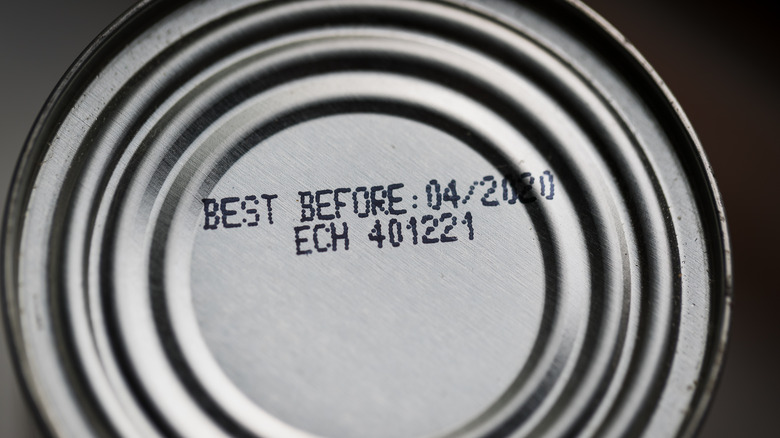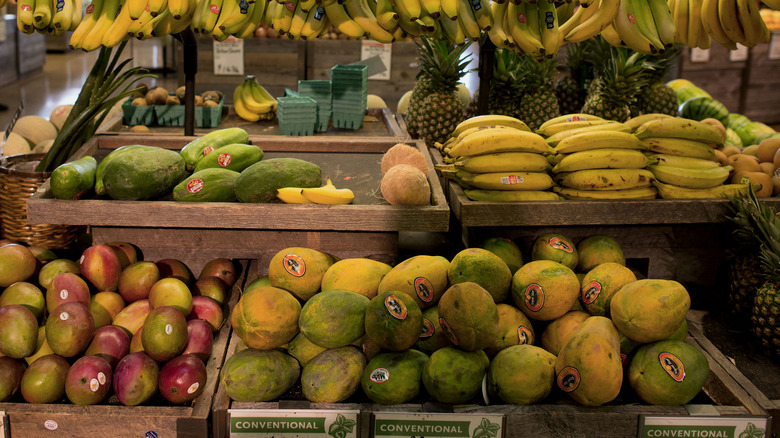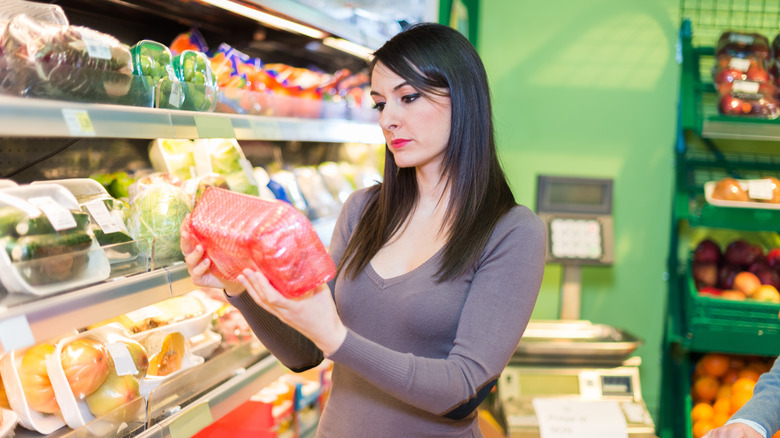The Messy Truth About Food Expiration Dates
In the middle of July, shoppers at Marks & Spencer (Britain's most popular supermarket chain, per YouGov), were told that the grocery store would be unveiling a new food label for 300 different fruits and vegetables, or about 85% of produce sold. The chain would be removing its "best before" labels and using a special code which staff could use to determine whether items are still considered fresh, per the BBC. The move, M&S director of food technology Andrew Clappen said, was part of the chain's effort to "do all we can to make sure none of it [food] gets thrown away."
While this might sound like the starting point for a food poisoning scenario, The Guardian makes the distinction between "best before" and "use by," with "use by" being a more serious measure, and one which warns consumers to discard or consume at your own risk. "Best before" is meant to tell a consumer when the product is at its best.
Far from being an audacious outlier, Marks & Spencer is late to the party, as several big British supermarket chains have already taken the step of removing the dates from the packaging that comes with their products.
Food experts say there are no guidelines for these best by dates
Getting rid of a "best before" label might seem like an audacious move that isn't likely to be copied in the United States. But advocates against food waste say it might be the right thing to do — particularly because, as CNN Business points out, there are no national benchmarks over its use.
Dana Gunders, executive director at the anti-food waste nonprofit ReFed, says "It is a complete Wild West ... many consumers really believe that they are being told to throw the food out, or that even when they don't make that choice, that they're sort of breaking some rule."
Emily Broad Leib, director of Harvard Law School's Food and Policy clinic, tells Vox there is a reason manufacturers add a best by date, and that is they want you to eat things when they taste the absolute best." Unfortunately, because there are no standards to decide what those dates might be, the date might be determined by a focus group — or it could be arrived at by sheer guesswork. Whatever that date might be, it has little or nothing to do with how sick you could be if you consume it by a certain time.
There are business-driven reasons for best before labels
Anti-food waste advocates have good reason to think "best before" labels have gone past their "use by" date. Vox cites statistics by the Harvard Food Law and Policy Clinic saying that a typical American family "throws out somewhere between $1,365 and $2,275" worth of food — which altogether adds up to 40% of food grown and/or produced in America. The publication also notes that the practice of tossing food based on a "best before" date is fairly common.
But experts point out that throwing out what some may think is "bad" food actually stems from a lack of understanding just what "best before" means; and in most cases, it does not mean "bad after." Worse, Vox also points out that there is an economic reason why teaching people that this is a misconception might not be in the interest of either grocers and food producers.
As Tamar Adler, author of "An Everlasting Meal: Cooking with Economy and Grace," points out to Vox, "It's in the general interest of anybody trying to sell anything to continue to perpetuate the illusion that our foods are going bad all the time," Adler said. "We could buy half as much food."
People can tell when food is off
So, what happens if labels are removed? We might find clues back in Britain, where another major supermarket chain, Morrisons, said in January that it would get rid of the "use by" dates on its store brand milk and would encourage customers to use the "sniff test" instead, per CNN Business — and this involves using our senses.
As ReFed executive director Dana Gunders told CNN Business, "When food is decayed past the point where we'd want to eat it, our defenses work very well. If food doesn't look good, if it doesn't smell good, if it doesn't taste good, if it's slimy ... then absolutely, we should not eat that food."
Instead of leaving its customers in the dark over its decision, Morrisons explained why it no longer wants its customers to adhere to a "Best Before" label, unless the customer has problems with smell or taste, that is. The grocer says: "Milk is the third most wasted food and drink product in the U.K., after potatoes and bread, with around 490 million pints wasted every year. And milk has the largest carbon footprint of these products because its production is so resource-intensive."



